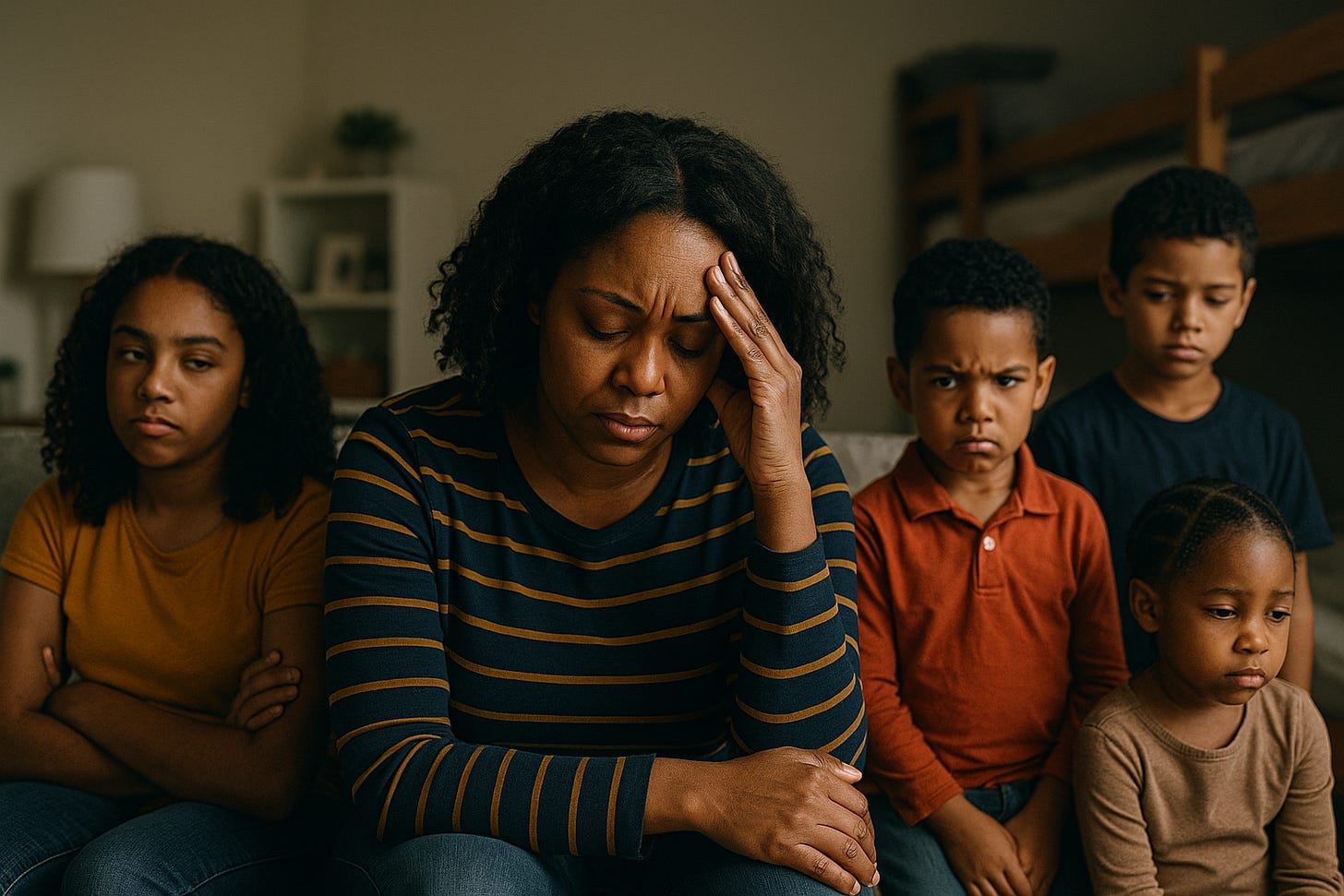The Parenting Guilt Trap
Why parents feel like they’re failing — even when they’re not.
Trap Therapy™ is the weekly interruption your protective patterns didn’t ask for — but desperately need if you’re done abandoning yourself.
The journal was still open on the coffee table, pen resting against the page I couldn’t finish the night before.
My chest was heavy from replaying our conversation. My daughter’s words were sharp and insistent nand so was the guilt I felt for even wanting to push back.
Guilt has a way of tricking me into silence. I tell myself:
You left the marriage.
You uprooted their normal.
You don’t have the right to ask for more.
So when the complaints come in the form of sighs, dismissive tones, and sharp remarks, I catch myself shrinking, convincing myself to let it go “to keep the peace.”
But the more I sit with it, the more I realize: it isn’t peace I’m protecting. It’s a pattern. A familiar one. The same pattern that taught me in an abusive marriage that my needs were negotiable, that respect was conditional, that silence was survival.
This week’s trap? The Guilt Trap.
Why We Get Stuck Here
If you’re a parent, guilt probably feels like a constant companion.
You feel it when you work late.
You feel it when you’re too tired to play.
You feel it when you say no — even when no is the healthiest answer.
We’ve been conditioned to believe guilt is proof of love — that “good parents” always feel a little guilty.
But here’s the truth: guilt doesn’t always mean you’re failing. Most of the time, it means there’s a script running in the background.
That script might come from:
Conditioning: the belief that “good” parents must sacrifice endlessly.
Low self-worth: a quiet doubt about whether you’re truly enough.
Fear of rejection: the worry that if you hold your boundary, love or approval will be withdrawn.
Either way, guilt is not the voice of truth. It’s the voice of programming. If we treat guilt as fact, we end up parenting from fear instead of alignment.
And here’s why that’s dangerous: guilt masquerades as proof of love. It whispers, If I feel guilty, it means I care. But guilt isn’t love. And living by guilt is unsustainable.
The Cost of Staying There
When you treat guilt as truth, you:
Overcommit your time and energy out of fear of failing your kids.
Hide your needs, teaching your kids that self-abandonment is love.
Parent from anxiety instead of alignment.
And kids notice. They learn more from how you live than what you say.
Why It’s Essential to Get Untrapped
If you stay trapped in guilt, two things happen:
You abandon yourself. You keep saying yes when you need rest. You silence your needs. You teach your nervous system that exhaustion is the price of being “good.”
Your kids inherit the script. They learn that love equals self-abandonment — and carry that pattern into their own lives.
Getting untrapped doesn’t mean becoming a perfect parent. It means breaking the cycle. It means showing your kids what it looks like to honor your limits, live from alignment, and trust yourself even when guilt whispers otherwise.
Because parenting from alignment creates kids who trust themselves — not kids who watch you abandon yourself.
On Thursday, I’ll share the Untrapped Moves — the practical shifts you can use to reframe guilt and free yourself from this trap. Until then, reflect:
When guilt shows up for me, is it pointing to failure… or is it pointing to an old script?




This was such an honest and grounding read. The way you described the cycle of guilt,feeling like no matter what choice we make, something gets sacrificed, really resonated with me. I think so many of us forget that guilt often shows up not because we’re failing, but because we care deeply.
Your reminder that “good enough really is enough” is powerful. It takes the pressure off chasing some impossible ideal of parenthood and brings it back to presence, love, and connection. That’s what our kids actually remember.
Thank you for writing this, it felt like a permission slip to breathe and let go of the constant second-guessing. 💛
I am pretty sure I was nodding along for the entire article, Shannon. I really appreciate how you’ve framed guilt as programming rather than proof of love. That distinction alone has the potential to free so many parents from cycles that feel inescapable.
In my own work, I see over and over how those “scripts” you describe are laid down early, through emotionally charged experiences that taught us our needs were negotiable or unsafe. What I love about your writing here is how you name guilt as a trap without demonizing it. You show how it was once protective, but is no longer aligned.
The way you connect this back to what kids learn from is spot on ("And kids notice. They learn more from how you live than what you say.) They absorb not only how we show them love, but how we show ourselves love.
Breaking the cycle doesn’t just change our lives, it rewires what’s possible for theirs too.
Thank you for sharing this, it’s powerful.